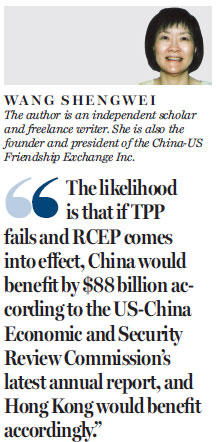HK should seize the day if Trump opts out of TPP
Updated: 2016-12-15 09:06
By Wang Shengwei(HK Edition)
|
|||||||
Wang Shengwei writes that China is well placed to benefit from the demise of TPP - a boon for the SAR as the country's entrepot for trade with the world
On Nov 21, US President-elect Donald Trump said in a short video message that he would move to withdraw "on day one" from the Trans-Pacific Partnership (TPP), the US-led 12-member deal that excludes China and covers 40 percent of world GDP and one-third of world trade. He considers TPP a potential disaster and said: "Instead, we will negotiate fair, bilateral trade deals that bring jobs and industry back onto American shores." Trump's position confirms his central campaign pledge of focusing on "America First", which may imply that the US-established world order is close to its end after 70 years.
However, China is in a different position. China became a member of the World Trade Organization in 2001 and since then has deeply integrated itself into the world economy. In 15 years, China's total GDP grew nearly tenfold and jumped from the world's sixth rank to No 2. The stalled TPP puts China in the free-trade pole position and opens opportunities for writing new rules for international trade.

Earlier, speaking at the APEC CEO Summit in Lima, Peru, President Xi Jinping called on countries to speed up the negotiation of the Regional Comprehensive Economic Partnership (RCEP) as the basis for building the broader Free Trade Area of the Asia-Pacific (FTAAP) to pave the way for a more inclusive global economy. RCEP excludes the US but includes 10 ASEAN countries plus Australia, China, India, Japan, New Zealand and South Korea; it covers 32 percent of world GDP and 30 percent of world trade. FTAAP includes the US and China and 19 other world economies; it covers 55 percent of world GDP and 44 percent of world trade.
How will all this affect Hong Kong? We enjoy a strategic geographical advantage, a well-developed infrastructure and a superb international communication network. Plus we play an important role as entrepot for trade between the Chinese mainland and the world. In 2015 Hong Kong was the world's eighth-largest trading economy in goods and the seventh-largest exporter and importer.
Due to our close trade links with the mainland, any mainland trade growth or decline would inevitably affect Hong Kong. For example, in 2015 we were the second-largest trading partner of the mainland (after the US), with a trade value accounting for 8.7 percent of its total trade; also we were the mainland's second-largest export market, taking up 14.6 percent ($331.6 billion) of its total exports. In the same year, the value of goods re-exported through Hong Kong from and to the mainland was $410.3 billion, comprising 89.4 percent of our total re-export trade value.
Such a strong mainland-HK trade relationship would ensure that if the mainland could benefit from the demise of TPP, such benefits would also accrue to Hong Kong.
The US-based Peterson Institute for International Economics estimates that TPP would increase trade activity between its member countries, while China's annual export loss would be about $100 billion. But this gloomy scenario presumably will no longer happen. The likelihood is that if TPP fails and RCEP comes into effect, China would benefit by $88 billion, according to the US-China Economic and Security Review Commission's latest annual report, and Hong Kong would benefit accordingly.
So, can Hong Kong afford to stay complacent? Answer: "No."
We know that while the US economic loss presents opportunities for China as a whole, Hong Kong must also beware the economic difficulties that may result from a more protectionist environment.
Therefore the SAR should ride the post-TPP tide and aggressively expand its bilateral and multilateral trade agreements.
First, Hong Kong must complete its negotiations with the ASEAN countries for a free-trade agreement. ASEAN is economically the fastest growing group globally, and is our fourth-largest export market and second-largest trading partner. The Hong Kong-ASEAN Free Trade Agreement, coupled with the mainland and Hong Kong Closer Economic Partnership Arrangement (CEPA), would provide a solid platform to facilitate trade and investment among Hong Kong and ASEAN countries and enhance our role as a regional trading hub. This would also facilitate Hong Kong's partnering with ASEAN countries and companies participating in the Belt and Road (B&R) Initiative which encompasses about 60 countries and covers 40 percent of world GDP and over 60 percent of world population.
Hong Kong's next major task is to work closely with the Beijing-led Asian Infrastructure Investment Bank (AIIB), a financial vehicle closely connected with the B&R.
After the AIIB was established at the end of 2015, 57 countries had signed its inter-governmental agreements. As China's first multilateral financial institution, AIIB will provide new opportunities for countries both inside and outside Asia.
James Woolsey, a Trump senior adviser on national security, defense and intelligence, has said that the Obama administration's opposition to AIIB is a "strategic error". He hoped Trump would be more enthusiastic about China's B&R Initiative. Perhaps we can hope that when Trump takes office in January 2017, there may be a US policy change favoring more US-China cooperation.
(HK Edition 12/15/2016 page1)